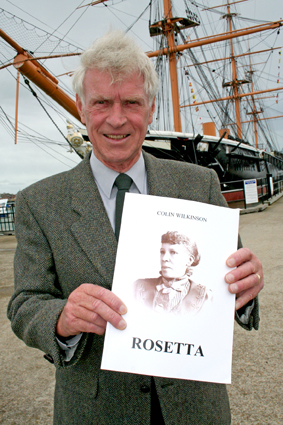Family history involves slavery, shipwrecks and HMS Warrior
IT’S a fascinating story that encompasses slavery, shipwrecks and life in the Royal Navy.

Colin Wilkinson with his book outside HMS Warrior
Colin Wilkinson, from St Peter’s Church, Titchfield, has written a book that focuses on his great-grandmother Rosetta, who was the daughter of an African slave. It’s come about after painstaking family research over many years.
Proceeds from the book Rosetta will go towards the Portsmouth branch of the Samaritans. It is being sold at the Liverpool Slavery Museum, HMS Warrior 1860 at Portsmouth Historic Dockyard, and at the Samaritans office in Portsmouth.
The book tells the story of how Rosetta’s father Asa Asa, who was born in Nigeria in 1812, was captured by slave-traders and became a slave seaman, crewing a French ship that was taking slaves from Cape Coast in Ghana to the West Indies.
This ship, the Perle, was shipwrecked in 1825 near St Ives in Cornwall, where residents took sympathy on those who had survived the journey. One of the town’s inhabitants was a friend of abolitionist William Wilberforce. He made sure the five slave crewmen were liberated.
Asa learnt English and started work as a servant in the household of George Stephen. He was baptised and given the name Lewis Asasa. He was a footman for Mr Stephen, who travelled across the country speaking for the abolition of slavery, and Lewis became something of a celebrity, as his story was often told by campaigners.
He met Elizabeth Cook, Rosetta’s mother, while travelling near Somerset in 1827, and they married and lived in London from 1831. Rosetta was born in 1838.
Lewis Asasa was working as a seaman in the Port of London when he was recruited to join the Royal Navy. In 1841, he joined HMS Wilberforce and returned to the country of his birth as part of the Great Niger Expedition. Among other things, it aimed to persuade local Nigerian tribes to stop selling their people into slavery.
After serving on a number of other ships, he joined HMS Warrior, the Navy’s first iron-clad ship, in 1861. It was a prestige appointment, and he retired from the Navy two years later after 21 years of faithful service.
Rosetta grew up and married William Thatcher, who had also joined the Royal Navy and fought in the Crimean War and the American Civil War. Lewis Asasa died in 1869, a year after Rosetta gave birth to Ernest Thatcher – Colin Wilkinson’s grandfather.
Ernest moved to Southsea in 1909 with his wife and family, and also fought in the First World War. Rosetta also moved to Southsea in 1912 and was buried in Highland Road cemetery in 1921 aged 83.
Colin Wilkinson initially heard the stories of Lewis Asasa and Rosetta from his great-uncle Frank, and has collaborated with Peter and Tony Thatcher, who are also her great-grandsons.
“Lewis Asasa led the most incredible life, whose story I have never known to be surpassed,” he said. “He led a Christian and blameless life, and was loved and respected by all who knew him.
“And the journey of my discovering for Rosetta has been wondrous, she remains our matriarch and our beacon of the way to live.”
For more details, to order a copy or for collection, contact the Samaritans at 296 London Road, North End, Portsmouth PO2 9JN, ring 023 9269 1313 or see www.samaritans.org/portsmouth.